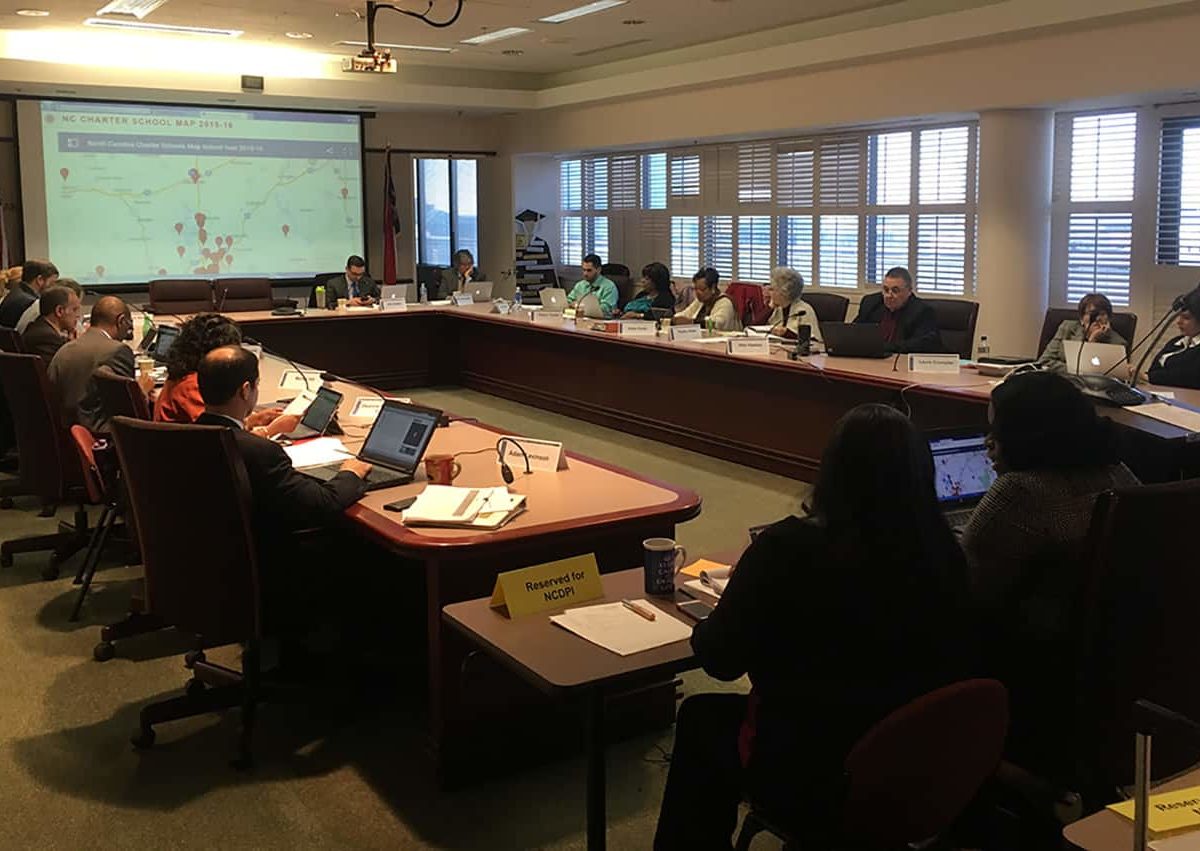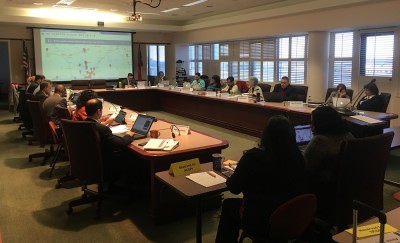

A lack of clarity regarding the financial relationship between a proposed charter school and its for-profit education management organization (EMO) was just one of the concerns that scuttled a school’s chance for approval last week.
On the second day of the Charter School Advisory Board meeting, Rowan County’s Paul L. Dunbar Charter School was given a not ready-to-open recommendation by a unanimous Advisory Board vote.
Kenneth Fox, Dunbar Charter’s board chair, described East Spencer — the town the school would have served — as a high-poverty, mostly African-American town without a school. Fox is also a former mayor of the town.
“I grew up in that community,” Fox said in an opening statement. “And when you are dealing with poverty, a lot of these children … as a child from poverty from that community, you confront oppression from within your own community, isolation, and ridicule.”
After the statement, Fox was asked by Advisory Board member Steven Walker about his 2006 federal conviction for an assortment of crimes — including mail fraud, wire fraud, and bribery — which resulted in 41 months in prison and a penalty of $1.5 million dollars in restitution.
“My first question is, with that in your background, why should we trust you as the board chair with millions of state dollars?” Walker asked. “That’s my question to you. And then second, my question to the board is: Were you aware of that when you elected Mr. Fox to be the board chair?”
“Yes, sir, I think you should,” Fox answered in response to Walker’s first question. “I’ve served my time and I paid my debt to society.”
Whitney Peckman, a member of Dunbar Charter’s board, said that the board was aware of Mr. Fox’s criminal record. But when the Advisory Board put the question to Sophia Copeland, the school’s treasurer, she seemed unaware and noted that she had been absent from the board for a few weeks due to personal reasons.
Later in the meeting, Advisory Board Member Alan Hawkes expressed concern over the board treasurer being unaware of the chair’s past criminal convictions.
Walker told the rest of the Advisory Board that Fox’s federal conviction didn’t show up in a state background check of the prospective charter school.
“And that’s concerning to me,” he said.
Walker also asked about Dunbar Charter’s partnership with Torchlight Academy Schools LLC, the EMO that would do the school’s fiscal management. He said it appeared the organization only had experience managing its own charter, Torchlight Academy in Raleigh, formally known as Northeast Raleigh Charter Academy.
And the financial arrangement between Dunbar Charter and its EMO was a concern for some Advisory Board members who questioned whether the EMO would be receiving 97 percent of the school’s net surplus after expenses.
Dr. Cynthia McQueen, who serves as the principal of Torchlight Academy, is the vice board chair for Dunbar Charter and is married to Don McQueen.
The application said the McQueens formed Torchlight Academy Schools LLC in order to “bring high quality education to a broader population of students, especially to those who are at-risk and economically disadvantaged,” and that Cynthia would recuse herself from votes involving the management company in her role as vice board chair.
Walker also asked about Dunbar Charter’s relationship with Ozie Hall, saying that he saw in the school’s board minutes that Hall was acting in an advisory capacity to the Dunbar board. Hall is the former principal of the Kinston Charter Academy.
Kinston Charter shut down in 2013 after it became clear that state education officials wanted its charter revoked. Following the closure, the Office of the State Auditor looked into allegations of “potential misspending by administrators” at the school. Read the State Auditor’s 2015 investigative report on Kinston Charter here.
A school representative told the Advisory Board that Hall was not officially associated with the school’s board and had only offered his opinion on a couple of occasions.
Advisory Board member Mike McLaughlin questioned the low performance and significant surpluses of Torchlight Academy, the sole school operated by Dunbar Charter’s EMO.
Torchlight Academy received a School Performance grade of “F” in 2014-15 and didn’t meet expected growth. And according to Dunbar Charter’s application, Torchlight Academy had a net unrestricted balance of $484,780 in 2014 and $534,796 in 2015. The application indicated that these large financial surpluses were one reason why the EMO was a good choice to manage Dunbar Charter.
“I’m trying to understand the surplus and how large it is given that the school is not performing,” said McLaughlin. “It makes me wonder why that money is not being plowed back into that school.”
Advisory Board member Phyllis Gibbs made a motion to not recommend Paul L. Dunbar for ready-to-open status. The motion was first seconded by Advisory Board member Eric Sanchez, but Hawkes interjected.
“I would like to second that if Eric doesn’t mind,” said Hawkes.
Hawkes is a vocal charter school advocate appointed to the Advisory Board by Senate President Pro Tempore Phil Berger (R-Rockingham). According to the Charlotte Observer, in addition to being the founding member of two charter schools in Guilford County, Hawkes has been critical of Advisory Board decisions not to approve some charters. He went so far as to write in an email last May that the Advisory Board has been “judgmental and punitive” in some of its rejections, the newspaper reported.
While Dunbar Charter was not recommended for ready-to-open status, Hawkes said he would like to see the school’s application come back before the Advisory Board but with a tighter management agreement with an EMO.
“Yeah, it does sound like the need is there” said Hawkes. “I really am uncomfortable with some of the fiscal responsibility that is being shown by the board right now.”
Before the Advisory Board made its decision, Fox said in a closing statement that he didn’t want to be an impediment to Dunbar Charter’s approval.
“If my being on the board is the only concern, I would gladly resign cause this community does need this school and these experts” said Fox, referring to his fellow board members.


